
Lavash is a soft, thin unleavened flatbread made in a tandoor and eaten all over the South Caucasus, Western Asia and the areas surrounding the Caspian Sea. Lavash is one of the most widespread types of bread in Armenia, Azerbaijan, Iran and Turkey.
Azymite is a term of reproach used by the Orthodox Churches since the eleventh century against the Latin Churches, who, together with the Armenians and the Maronites, celebrate the Eucharist with unleavened bread. Some Latin controversialists have responded by assailing the Greeks as "Fermentarians" and "Prozymites".

Sacramental bread, sometimes called altar bread, Communion bread, the Lamb or simply the host, is the bread used in the Christian ritual of the Eucharist. Along with sacramental wine, it is one of two "elements" of the Eucharist. The bread may be either leavened or unleavened, depending on tradition.
Unleavened bread is any of a wide variety of breads which are not prepared with raising agents such as yeast. Unleavened breads are generally flat breads; however, not all flat breads are unleavened. Unleavened breads, such as the tortilla and roti, are staple foods in Central America and South Asia, respectively.

Barbari bread is a type of Iranian flatbread. It is one of the thickest flat breads. It is widely known as Persian flatbread in United States and Canada.

Laobing is a type of unleavened flatbread popular in parts of northern China, including Beijing. It is sometimes referred to as a Chinese pancake.
Some Christians observe a form of the Jewish holiday of Passover. The practice is found among Assemblies of Yahweh, Messianic Jews, and some congregations of the Church of God. It is often linked to the Christian holiday and festival of Easter. Often, only an abbreviated seder is celebrated to explain the meaning in a time-limited ceremony. The redemption from the bondage of sin through the sacrifice of Christ is celebrated, a parallel of the Jewish Passover's celebration of redemption from bondage in the land of Egypt.
High Sabbaths, in most Christian and Messianic Jewish usage, are seven annual biblical festivals and rest days, recorded in the books of Leviticus and Deuteronomy. This is an extension of the term "high day" found in the King James Version at John 19:31.
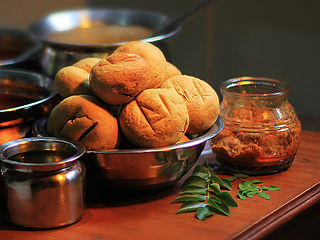
Baati is a hard, unleavened bread cooked in most of areas of Rajasthan, and in some parts of Madhya Pradesh and Gujarat states of India. It is prized for its long shelf life and high nutritional content, and, in desert areas, for the minimal quantity of water required for its preparation. Baati is commonly eaten with dal, hence also referred to as dal baati. In some regions, especially Madhya Pradesh, it is also paired with a roasted aubergine mash called bharta. Baati is also closely related to litti (cuisine), popular in eastern Uttar Pradesh (Varanasi) and western Bihar. Litti potato, tomato and roasted aubergine).
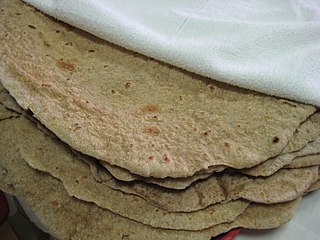
Markook bread, also known as khubz Ruqaq, shrak, khubz rqeeq,, mashrooh is a kind of Middle Eastern unleavened flatbread common in the Levant and the Arabian peninsula. It is baked on a convex metal griddle or in a tannour.
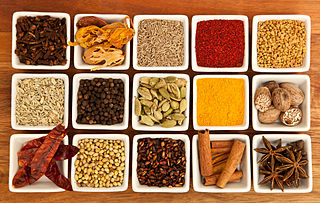
Indian breads are a wide variety of flatbreads and crêpes which are an integral part of Indian cuisine. Their variation reflects the diversity of Indian culture and food habits.
A meal offering, grain offering, or gift offering, is a type of Biblical sacrifice, specifically a sacrifice that did not include sacrificial animals. In older English it is sometimes called an oblation, from Latin.
Yufka may refer to one of two kinds of dough product in Turkish cuisine:
"Azymes" is an archaic English word for the Jewish matzah, derived from the Ancient Greek word ἄζυμος (ἄρτος) ázymos (ártos), "unleavened (bread)", for unfermented bread in Biblical times; the more accepted term in modern English is simply unleavened bread or matzah, but cognates of the Greek term are still used in many Romance languages. The term does not appear frequently in modern Bible translations, but was the usual word for unleavened bread in the early Catholic English Douay-Rheims Bible.
Unleavened Bread is a 1900 novel by American writer Robert Grant, and one of the best selling books of that year.
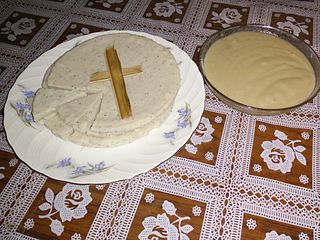
Pesaha Appam or Inriyappam or Kurisappam is the unleavened Passover bread made by the Saint Thomas Christians of Kerala, India to be served on night of Maundy Thursday. The white-ish Pesaha appam is a firm rice cake. It is made from rice batter like Palappam, but is different from palappam in that it is not fermented with yeast in its preparation. The meal also includes small banana variants in Kerala such as Poovan Pazham or Njalipoovan Pazham. The brown palkurukku is made mainly using jaggery and coconut milk. A cross is made using the palm leaves from Palm Sunday and placed it on the middle of the batter.
Etablissement René Neymann is a French company founded in 1850 that makes unleavened bread. It is the oldest company of unleavened bread operating in France. The general manager is Jean-Claude Neymann, who represents the 5th generation of managers of this familial and artisanal company.
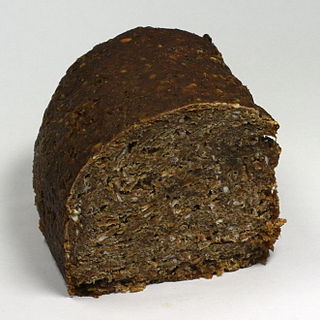
Bread has a significance beyond mere nutrition in many cultures in the Western world and Greater Middle East because of its history and contemporary importance. Bread is also significant in Christianity as one of the elements of the Eucharist; see sacramental bread. The word companion comes from Latin com- "with" + panis "bread".
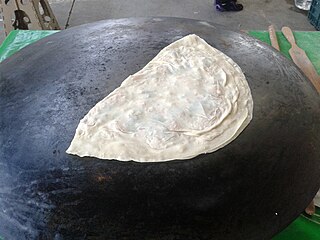
Saj bread (Turkish: sac ekmeği or yufka) is a very thin, large (60cm) unleavened flatbread in Turkish and Arab cuisine baked on a convex metal griddle, a saj.









